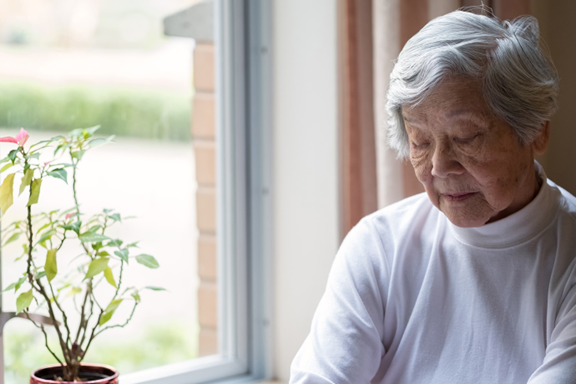Published on: February 14, 2023

Social isolation results from not having enough meaningful connections with people—it can happen because of a lack of transportation, you don’t have many friends nearby, or your family living far away. Social isolation and loneliness has been linked to depression, anxiety, other mental health issues, and physical health problems like heart disease and serious health conditions.
Alzheimer’s disease developed dementia and affects your ability to remember things and process information accurately. It also impacts your ability to understand language, remember faces, follow instructions, and perform familiar or routine tasks (like cooking). In addition, if you have Alzheimer’s disease or another form of dementia, it can become increasingly difficult for you to connect with others in meaningful ways—even if you want to!
Alzheimer’s disease is a degenerative brain disorder that causes problems with memory, thinking, and behavior. It is the most common form of dementia, a general term for loss of mental function that normal aging can’t explain.
There are many contributing factors to Alzheimer’s disease; some are more controllable than others. One factor you can’t control is isolation—being alone for long periods.
A recent study found that social isolation may increase the risk of Alzheimer’s disease in older adults by as much as 60%. The researchers looked at people ages 68-94 who had not been diagnosed with Alzheimer’s yet and asked them how often they interacted with other people during the previous year. They also tested their memory and thinking skills every two years over six years.
The researchers found that those who reported being socially isolated were more likely to develop Alzheimer’s during this time than those who reported having frequent interactions with others. The effect was stronger in women than men, but both groups showed an increased risk of developing Alzheimer’s when isolated.
We’re all busy. We’ve got a lot going on, and we just can’t find the time to make friends.
It’s not that we don’t want to; it’s just… so much other stuff. To be honest, I’m not sure how people do it.
But guess what? You don’t have to!
A recent study has linked social isolation with the risk of developing Alzheimer’s disease later in life. So that means that if you don’t have friends or family members around and you’re feeling lonely all the time, you might want to get out there and make some new connections!
There are tons of ways to meet new people: go out for coffee with coworkers or classmates, join a club or community group where everyone will be nice and friendly (not like those mean kids at school), or even look up activities in your area (like hiking) so you can meet people who enjoy the same hobbies as you do!
As an older adult, it can be easy to feel like you’ve lost your place in the world. But there are plenty of ways to stay connected and involved in your community as you age, even if you’re not as physically active or non-disabled as you once were.
Social isolation is a huge problem, especially for older adults. There are many reasons to avoid social isolation: it’s linked to depression, heart disease, brain health and even Alzheimer’s. But it can be hard to know how to avoid the trap of isolation when you’re on your own. Here are some tips that may help:
· Make sure you have at least one friend you can count on for support and companionship.
· Find activities that involve other people—even if it’s just once or twice a week. You might like yoga or dance lessons or enjoy volunteering at the local animal shelter. Find something that works for YOU!
· If you feel isolated in your community, try reaching out to new people by joining a club or organization where there will be others with similar interests and social events planned throughout the year.
· Make sure someone checks in on you regularly so they can see if anything needs done around your house (i.e., cleaning or repairs). This will help ensure that everything is running smoothly without having to rely solely on yourself for everything!
· Stay in touch with old friends by calling or writing letters—either way is fine! Make sure they know how much they mean to you by regularly keeping in touch with them.
· Volunteer with an organization that helps others in need—this will help keep you active and engaged with society with social interaction and give back to those who may not have as much as we do ourselves (which is most of us).
F For more information about Mental Health Conditions. Visit our Mental Health Library page. To understand and cope with your psychological symptoms, get help from our Top 10 Psychiatrists, Psychologists, and Therapists who are known for providing the best mental health treatment and psychiatry services. To book an appointment please call us at (800) 457-4573 or submit an appointment request.
Discover the essence of Harmony United Psychiatric Care through our impactful numbers. Our experienced team is dedicated to fostering mental well-being.
10
+
Years of Experience
With 10 years of unwavering commitment to mental health, we bring a wealth of experience to support our patients on their journey.
About Us64
+
Providers
Our dedicated team comprises 64 skilled therapists', psychiatrists', psychologists', ensuring personalized and expert care for each individual.
Providers20
+
Locations
Across multiple locations, we extend our reach to provide accessible mental health care tailored to diverse communities.
Locations114581
+
Patients Served
Over 114581 patients have entrusted us with their mental well-being, experiencing compassionate care and positive outcomes.
Book AppointmentWelcome to the latest edition of “Discover Harmony,” the newsletter from Harmony United Psychiatric Care! In this edition, we bring you insights, updates, and valuable information to support your mental well-being journey.
Subscribe to newsletter